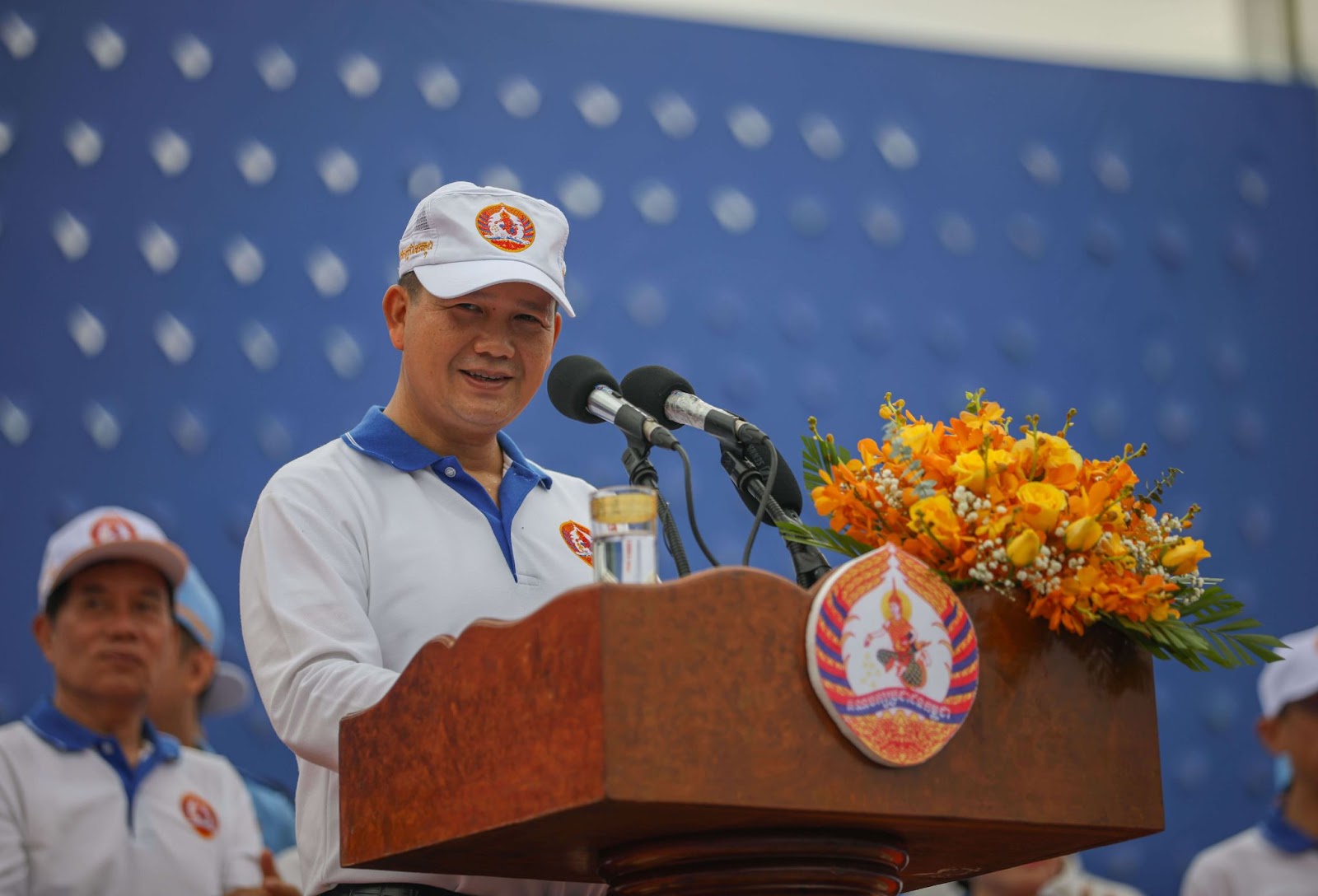On Friday, the light blue shirts of the ruling Cambodian People’s Party (CPP) flooded downtown Phnom Penh in a kilometres-long motorcade marking the end of the official election campaign season.
The rally ushered in an all-but-assured victory for Cambodia’s long-time Prime Minister Hun Sen in the 23 July national elections.
Hun Sen, who has ruled the country since 1985 and has spent close to four decades consolidating power, was noticeably absent. His eldest son and chosen successor, military commander Hun Manet, headlined the event.
“Today is our victorious day. Be ready to roll out the landslide motorcade for the political campaign across the capital,” said Manet, kicking off the rally in Phnom Penh. “We are fully committed to the policy of Samdech Techo [Lord] Hun Sen, who is the president of the party and has high accountability for the faith, future of the country and the people.”
Hundreds of motorbikes and dozens of cars rallied on Koh Pich, a neighbourhood in southern Phnom Penh also known as Diamond Island, in the early morning of 21 July. Southeast Asia Globe followed the motorcade as supporters drove into the heart of the capital.
In the past few months, the election campaign trail has been littered with crackdowns on rival political parties, prominent opposition leaders and independent news outlets. These ruling party tactics were honed in the lead-up to the most recent national elections in 2018, after the former opposition Cambodia National Rescue Party (CNRP) was forcibly dissolved the year prior.
This year, it was the Candlelight Party – a reconstituted version of the earlier opposition – that was snuffed out before the ballot. The party won about 22% of the popular vote in last year’s commune elections, a national contest in which Cambodians select local leadership, and was seen as the sole viable contender for this year’s poll. However, the National Election Committee disqualified the party in May on a paperwork requirement, knocking it out before the campaign season.
Candlelight officials declined to comment on the election when reached on Friday. A day earlier, party President Teav Vannol told Japanese media that “excluding the Candlelight Party is like killing democracy in our country.”
With opposition swept aside, Hun Sen has been relentlessly outspoken about the need for Cambodians to vote. Meanwhile, the CPP-dominated National Assembly has passed laws barring non-voters from running for office in the future, as well as criminalising calls to boycott the election.
The week before the election, police arrested four Candlelight members and accused them of urging others to spoil their ballots in protest. Authorities also convicted in absentia 17 members of the former CNRP – including long-time opposition leader Sam Rainsy – who are already living in exile after the court-ordered dissolution of their party and subsequent mass criminal trials of its members and supporters.
“Cambodians are thirsting for democracy and change. Hun Manet will simply be a continuation of a family dynasty,” said Rainsy, speaking to a reporter from Paris. “Regardless of which party they support, Cambodians are being denied their right to cast their vote in a free, fair and competitive election.”


There may be 18 parties listed on Sunday’s vote, but the 70-year-old Hun Sen is expected to mark a landslide victory. The CPP plans to form a new government in August. While Hun Sen has yet to announce when he will officially transfer his title to his son, he has hinted it could be within a month of elections.
Rainsy was dismissive of the planned transmission, saying the lack of a viable opposition in the election means the heir apparent Manet “will not have a democratic mandate to govern” when he eventually takes office.
Hun Sen has said publicly that he intends to play an active role in statecraft after his son takes over. Though the transition in the top office will be the first of its kind in modern Cambodian history, it is unclear how much governance within the Kingdom will change.

Mat Rodrath left his home in the Muslim section of the capital’s Chroy Changvar district at 5 a.m. to join the city-wide motorcade. Rodrath lauded Manet’s education at the U.S. Military Academy at West Point, saying he’s the most qualified for premiership among the ruling party’s younger echelon.
The 40-year-old supporter also echoed Hun Sen’s long-time political stumping point, his “Win-Win Policy”, which ended the civil war with the Khmer Rouge with a mass amnesty programme. The prime minister had started his career as a young cadre of the communist movement but defected to Vietnam to escape its later purges. He returned to Cambodia with the 1979 Vietnamese invasion, a response to border incursions by the virulently xenophobic Khmer Rouge, and rose through the ranks of the single-party state established under the subsequent Vietnamese occupation.
When the Vietnamese military left Cambodia in 1989, the government led by Hun Sen in Phnom Penh shouldered the fight against the remaining communist insurgency. His faction’s eventual victory in that conflict has been key to the political currency of the CPP and his own personal brand. Though this legacy might be less salient to young Cambodians, Hun Sen and his supporters have long pointed to the spectre of conflict, both in the past and in an imagined future, when promoting CPP rule.
“My parents went through the war for three years, eight months and twenty days,” said Rodrath, as rain swept Phnom Penh, dousing him and thousands of other supporters. “I’ve come to support [the party] because I don’t want war.”


